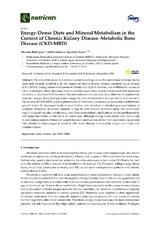Energy-Dense Diets and Mineral Metabolism in the Context of Chronic Kidney Disease–Metabolic Bone Disease (CKD-MBD)
Autor
Rodríguez, Mariano
Aguilera Tejero, Escolástico
Editor
MDPIFecha
2018Materia
DietCalories
Fat
CKD-MBD
METS:
Mostrar el registro METSPREMIS:
Mostrar el registro PREMISMetadatos
Mostrar el registro completo del ítemResumen
The aim of this paper is to review current knowledge about the interactions of energy-dense diets and mineral metabolism in the context of chronic kidney disease–metabolic bone disease (CKD-MBD). Energy dense-diets promote obesity and type II diabetes, two well-known causes of CKD. Conversely, these diets may help to prevent weight loss, which is associated with increased mortality in advanced CKD patients. Recent evidence indicates that, in addition to its nephrotoxic potential, energy-dense food promotes changes in mineral metabolism that are clearly detrimental in the context of CKD-MBD, such as phosphorus (P) retention, increased concentrations of fibroblast growth factor 23, decreased levels of renal klotho, and reduction in circulating concentrations of calcitriol. Moreover, in uremic animals, a high fat diet induces oxidative stress that potentiates high P-induced vascular calcification, and these extraskeletal calcifications can be ameliorated by oral supplementation of vitamin E. In conclusion, although energy-dense foods may have a role in preventing undernutrition and weight loss in a small section of the CKD population, in general, they should be discouraged in patients with renal disease, due to their impact on P load and oxidative stress.

